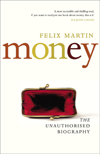Money: The Unauthorised Biography By Felix Martin
Book review: Money - The Unauthorised BiographyWriting a book about money was always going to be a bit of a gamble, says Piper Terrett. But for Felix Martin, it's one that's paid off.
Get the latest financial news, insights and expert analysis from our award-winning MoneyWeek team, to help you understand what really matters when it comes to your finances.
You are now subscribed
Your newsletter sign-up was successful
Want to add more newsletters?

Twice daily
MoneyWeek
Get the latest financial news, insights and expert analysis from our award-winning MoneyWeek team, to help you understand what really matters when it comes to your finances.

Four times a week
Look After My Bills
Sign up to our free money-saving newsletter, filled with the latest news and expert advice to help you find the best tips and deals for managing your bills. Start saving today!

Attempting a biography of money in your first book is an audacious task. Fortunately, Felix Martin, partner and economist at Liontrust Asset Management's global credit division, is largely up to the challenge. Martin, who worked at the World Bank on the reconstruction of the former Yugoslavia, argues that the conventional concept of money is so wrong it has prevented policymakers from delivering us from the global debt crisis.
This book is "stimulating and timely", says The Guardian. It demonstrates how money is centre-stage in most major political and economic conflicts and how economists and politicians' "blinkered view" of it as a "technicalminor issue" helped bring us to the edge of disaster in 2008. For Martin (and many other economists), money is not just an "alternative to barter" but rather a "socially created system of transferable credit". As such it is not just governments that can create it a point demonstrated by Bitcoin and the Bristol pound.
MoneyWeek
Subscribe to MoneyWeek today and get your first six magazine issues absolutely FREE

Sign up to Money Morning
Don't miss the latest investment and personal finances news, market analysis, plus money-saving tips with our free twice-daily newsletter
Don't miss the latest investment and personal finances news, market analysis, plus money-saving tips with our free twice-daily newsletter
This is a "surprisingly entertaining book", agrees The Economist. Particularly insightful is Martin's exploration of the Irish banking crisis 40 years ago when the system collapsed and businesses accepted IOUs and cheques, establishing "a new class of money". Then, "builders, greengrocers, mechanics and barmen all turned out to be dab hands at personal credit profiling".
This supports Martin's claim that money is not an exclusive state prerogative and that therefore sovereign support is "not particularly important". He notes that societies like the ancient Egyptians managed quite well without it, but concedes that it is the instrument through which later societies gained their freedom from static social hierarchies.
His solution to the crisis is the state underwriting only a tiny core of deposit-taking banks. What this will mean for many is: "If you lose your dough, tough. You knew the risks. It is a solution that will attract anyone seeking a clean, clear, fairway of managing financial markets. Until they lose their money, of course."
The trouble is, we all now have crisis fatigue, says the former deputy governor of the Bank of England, Howard Davies, in The Times, and "a small library of texts analysing its causes". Martin's "aim is to peddle his own patent remedy for the financial system's ills". His solution, where only banks involved in simple deposit-taking and money transmission services would get state help, is flawed. It assumes the credit needed for growth can be generated outside the banking system. "That is a big gamble, which no one has yet been prepared to take."
Money, The Unauthorised Biography by Felix Martin is published by Bodley Head, £20.
Get the latest financial news, insights and expert analysis from our award-winning MoneyWeek team, to help you understand what really matters when it comes to your finances.
Piper Terrett is a financial journalist and author. Piper graduated from Newnham College, Cambridge, in 1997 and worked for Germaine Greer and for Adam Faith’s Money Channel before embarking on a career in business journalism.
She has worked for most top financial titles, including Investors Chronicle, Shares magazine, Yahoo! Finance and MSN Money. She lectures part-time at London Metropolitan University and is the author of four books.
-
 Should you buy an active ETF?
Should you buy an active ETF?ETFs are often mischaracterised as passive products, but they can be a convenient way to add active management to your portfolio
-
 Power up your pension before 5 April – easy ways to save before the tax year end
Power up your pension before 5 April – easy ways to save before the tax year endWith the end of the tax year looming, pension savers currently have a window to review and maximise what’s going into their retirement funds – we look at how
